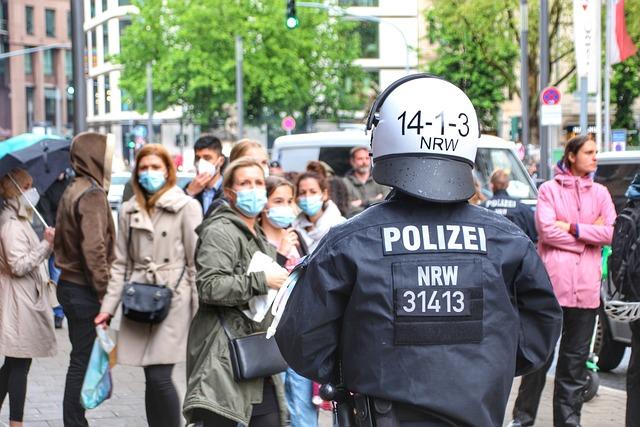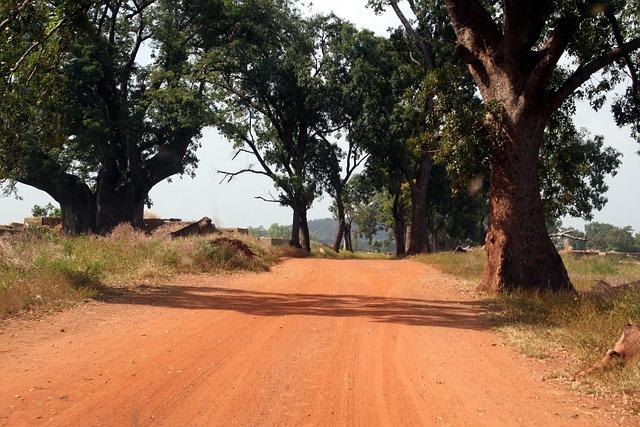In a notable geopolitical shift, the Economic Community of West African States (ECOWAS) confronts a challenge to its cohesion and influence within the region as Burkina Faso, Mali, and Niger officially sever ties with the bloc. The decision follows a series of military coups and growing discontent with ECOWAS’s interventionist policies, raising questions about the future of regional stability and collaboration among West African nations. This article delves into the implications of this loss of membership for ECOWAS, examining the political dynamics at play, the motivations behind the departures, and the potential impact on the security and governance landscape in West Africa. as the region grapples with persistent threats from extremist groups and deepening socio-economic crises, the ramifications of these departures could reshape alliances and strategies in the fight for stability in one of Africa’s most volatile areas.
ECOWAS Faces Challenges as Burkina Faso, Mali and Niger Withdraw from Membership
The recent decision by Burkina Faso, Mali, and Niger to withdraw from ECOWAS underscores a significant shift in the regional political landscape. These countries, all grappling with security challenges and political instability, have expressed dissatisfaction with the bloc’s effectiveness in addressing their concerns, particularly regarding the fight against terrorism and economic sanctions. This development raises important questions about the future cohesion and influence of ECOWAS in West Africa. Key challenges include:
- Increased Instability: The exit of these nations could exacerbate existing tensions within the region, making collaborative efforts to combat extremist groups more challenging.
- Economic Implications: The withdrawal threatens to disrupt trade relations and economic partnerships that have been built over decades.
- Political Isolation: These countries may find themselves increasingly isolated, both politically and economically, as they distance themselves from the established norms of regional cooperation.
Furthermore,this exodus also raises concerns regarding ECOWAS’s ability to maintain its credibility and authority as a pillar of regional governance. With rising anti-French sentiment and a shift towards military-led regimes in these nations, the focus on collective security and democratic governance is being undermined. A potential silver lining is the opportunity for ECOWAS to reassess its strategies and objectives.To understand how these developments might reshape the regional politics,a comparative analysis of the states’ membership benefits and newfound trajectories can be insightful:
| Country | Year Joined ECOWAS | Withdrawal Year | Main Reason for Withdrawal |
|---|---|---|---|
| Burkina Faso | 1975 | 2023 | Political Instability |
| Mali | 1977 | 2023 | Security Concerns |
| Niger | 1967 | 2023 | Economic sanctions |

The Implications of Exit: Regional Stability and Security Risks
The recent withdrawal of Burkina Faso, Mali, and Niger from ECOWAS brings forth significant ramifications for regional stability and security. As these nations embrace military-led governance, concerns about a potential domino effect in neighboring countries are mounting. The following points underscore the emerging security challenges:
- Increased Insurgency: The exit may embolden extremist groups, escalating violence and instability.
- Border Tensions: A reconfiguration of alliances could lead to territorial disputes and heightened military presence along borders.
- Humanitarian Consequences: Prolonged instability poses risks to civilians, possibly leading to displacement and a humanitarian crisis.
Moreover, the geopolitical landscape in West Africa is highly likely to shift, creating an environment ripe for external influences. Outside actors may seize the opportunity to fill the vacuum left by ECOWAS,potentially leading to:
- Increased Foreign Intervention: External powers might seek to establish footholds,complicating regional dynamics.
- Disruption of Trade Agreements: The severed connections may hinder economic cooperation and exacerbate regional poverty.
- Diminished Collaboration Against Terrorism: The fight against terrorism could be undermined due to fragmented support structures.

Economic Consequences of Membership Loss for ECOWAS and Member States
The recent departure of Burkina Faso, Mali, and Niger from ECOWAS poses significant economic challenges for both the regional bloc and the affected member states. As one of the principal regional organizations aimed at fostering economic integration and political stability in West Africa, ECOWAS has worked to promote free trade, shared resources, and collective governance. The exit of these nations is poised to disrupt existing trade agreements and economic collaborations, potentially leading to:
- Decreased Trade Volume: The withdrawal may limit inter-country trade and reduce access to larger markets, impacting domestic economies.
- Investment Deterrence: Foreign investors may perceive the instability in the region as a risk, leading to a decline in investment inflows.
- increased Economic Isolation: A loss of collaborative economic initiatives could isolate member states from critical support channels, affecting development projects and infrastructure investments.
Economically, the ramifications for Burkina Faso, Mali, and Niger are also considerable. The loss of ECOWAS membership may intensify economic hardships, especially given the potential for decreased aid and support from other member states. The following table outlines the key economic indicators that may be affected:
| Country | GDP Growth Rate (2023) | Trade Volume with ECOWAS (Estimated) | Foreign Direct Investment (FDI) Trends |
|---|---|---|---|
| Burkina Faso | -1.2% | $300 million | Declining |
| Mali | -2.3% | $250 million | Stagnant |
| Niger | -0.5% | $200 million | Declining |
This departure not only threatens the economic viability of these nations but also challenges the overall efficacy of ECOWAS as a platform for economic prosperity and stability in West Africa.

Political Repercussions: The Shift in Power Dynamics within the Region
the recent suspension of Burkina Faso,Mali,and Niger from the Economic Community of West African States (ECOWAS) marks a significant turning point in regional politics. This decision stems from the military coups that have reshaped governance in these nations, indicating a growing divide between member states and those under military rule.As the authority of ECOWAS is called into question,the balance of power within West Africa has begun to shift,potentially empowering alternative alliances and non-state actors. The fallout from this change could lead to a stronger focus on internal security and regional autonomy in governance, as countries adjust their foreign policies and military cooperation based on new realities.
In light of these developments, the power dynamics in the region are becoming increasingly complex. Key players may shift their strategies to accommodate the changing landscape, leading to new alignments and partnerships. factors influencing this evolution include:
- Increased regional isolation: The departure of these countries may embolden others to assert independence from traditional frameworks.
- Enhanced bilateral relations: Countries may seek to cultivate direct relationships outside the ECOWAS structure.
- Security implications: A reallocation of resources and alliances may arise as states prioritize their security needs.
| Country | Status | ECOWAS Membership Impact |
|---|---|---|
| Burkina Faso | Suspended | Loss of economic support |
| Mali | Suspended | Trade disruptions |
| Niger | Suspended | Increased international scrutiny |
Recommendations for ECOWAS to Strengthen Unity and Prevent further Departures
Considering the recent departures of Burkina Faso, Mali, and Niger from the Economic Community of West African States (ECOWAS), it is indeed imperative for the institution to readdress its strategies and foster greater unity among its member states.Prioritizing dialog and constructive engagement is essential. ECOWAS should facilitate regular communication between member states to address grievances, share perspectives, and collaborate on mutual goals. Establishing a framework for peer review can aid in promoting accountability and clarity among leaders, fostering a renewed commitment to the principles of democracy and stability.
Additionally, enhancing economic collaboration through targeted initiatives may act as a binding agent for the community. ECOWAS could consider the implementation of joint economic projects that benefit multiple nations, thus serving as an incentive for cooperation and inclusivity. Incentivizing participation in the free movement of goods and services can strengthen economic ties, promoting regional interdependence. Furthermore, upholding a robust security framework to address regional challenges, such as terrorism and insurgency, is crucial.By ensuring collective security, ECOWAS can create a unified front, reducing vulnerabilities that may lead nations to consider withdrawal.
Future Prospects: Building a Resilient ECOWAS in the Face of Membership Challenges
The recent withdrawal of Burkina faso, Mali, and Niger from the Economic Community of West African States (ECOWAS) underscores the urgent need for a strategic re-evaluation of regional cooperation mechanisms. To build a resilient ECOWAS, more emphasis must be placed on fostering unity and addressing the root causes of discord among member states. potential strategies include:
- Strengthening Dialogue: Establishing more consistent communication channels among member nations to foster mutual understanding.
- Conflict Resolution Mechanisms: Creating effective frameworks to address disputes and political upheaval before they escalate.
- Inclusive Governance: Encouraging a participatory approach in decision-making processes to ensure all member states feel represented and valued.
In looking forward, ECOWAS must also adapt its policies to tackle the evolving political landscape. This may involve revisiting its criteria for membership and participation in regional initiatives, ensuring that actions align with democratic values and regional stability. Possible adjustments could include:
| Policy Focus | Action Points |
|---|---|
| Membership Criteria | Enhance focus on democratic governance and respect for human rights. |
| Regional Security | Collaborate on joint security operations to address common threats. |
| Economic Collaboration | Promote trade agreements that benefit all members, ensuring equitable development. |
The Conclusion
the expulsion of Burkina Faso, Mali, and Niger from ECOWAS marks a significant shift in the regional political landscape and raises important questions about the future of collaboration within West Africa. While ECOWAS has emphasized its commitment to democratic governance and stability,the departure of these member states highlights the challenges the organization faces amid ongoing political turmoil and security crises in the Sahel region. As these countries navigate their path forward,the implications of this divide will be felt not only within their borders but across the broader West African community. Moving forward, it remains crucial for ECOWAS and other regional actors to address the underlying issues that led to this fracture, fostering dialogue and cooperation that prioritizes peace and development in a rapidly evolving geopolitical context.The situation warrants close monitoring as it unfolds and will undoubtedly shape the dynamics of regional politics in the years to come.







